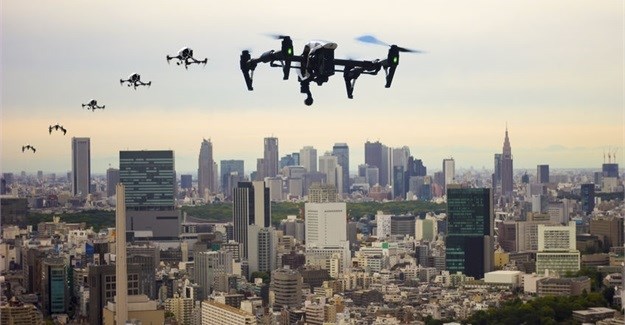
Top stories



ESG & SustainabilityRedisa calls on govt to fix South Africa’s “broken” waste management system
2 hours


HR & Management#TopEmployers2026: Nolo Thobejane on why people power KFC’s purpose
Shan Radcliffe 4 hours

More news











With Transnet National Port Authority's (TNPA) recent announcement that drone technology will be employed at South African ports, it seemed an opportune time to investigate how drones have been used in the maritime industry. It is certainly an exciting development!
TNPA advised at the recent African Ports Evolution conference that during a three-month trial in the port of Durban, a drone was used to deliver a package to a vessel to monitor traffic congestion on the roads leading to and from the port and to provide a bird’s eye view of the port infrastructure and operations. Aquatic drones were also used to perform hull inspections. The scope of the technology seems to be infinite.
In March this year, Maesk Tankers announced that it has successfully completed its first drone delivery to a vessel. It was part of an experiment to test whether drones could be used to supply vessels with spare parts, mail or medicine, replacing the more conventional delivery methods. While there are obvious cost benefits to using drones rather than helicopters, poor weather can hamper the operations of such a lightweight craft.
The trend has already taken hold in shipyards. For example, in September 2015 Poland's Remontowa Shiprepair Yard inspected the interior of a cargo tank using a drone to take videos and photographs of the tank surface to assess the condition of the tank’s protective coatings and to identify any defects that required repair.
The UK Royal Navy has also begun trial use of drones on the HMS Diamond - drones were able to get to hard to reach areas of the vessel while still at sea. In addition to the obvious time and cost saving, there is also a safety advantage in that drones can complete certain tasks that would be impossible or dangerous for people.
The Port of Busan in Korea advised in 2015 that it would use drones to monitor vessels anchoring in sea-lanes, ensuring that they were not doing so unlawfully. The use of the drones is also intended to be expanded to monitor the condition of container stacks and the safety of vessels in port, as is already the case in the port of Abu Dhabi.
There is even talk of fitting drones with emission sensors to enable monitoring of emissions from vessels and thus reducing marine pollution.
However, there are concerns: drones could malfunction, be lost at sea or fall onto a vessel. While local laws and regulations differ, the primary imperative is that they must be flown with safety in mind, with due regard to other aircraft in the air as well as vehicles, property and lives on the ground. There is also the ever-present threat of terrorism and while the advancement of the technology is primarily for good, it can easily be put to illegal use.
A recent example is an alert posted by Gard, a protection and indemnity society. A vessel entered with Gard was detained by Egyptian authorities after transiting the Suez Canal. The reason: a crew member had launched a drone to document the vessel’s progress through the canal. The seemingly innocent act resulted in the Master being instructed by the Canal Authorities (SCA) to drop anchor. During the ensuing inspection, the drone and its memory card were seized and the vessel detained pending further investigations.
South Africa’s drone regulations came into effect in July 2015 and while considered to be amongst the strictest in the world, they are also widely criticised for being impractical and lagging behind the rapid advancement of drone technology. For commercial use, the drone must be approved and registered by the South African Civil Aviation Authority while the operator of the craft requires a remote piloted aircraft licence.